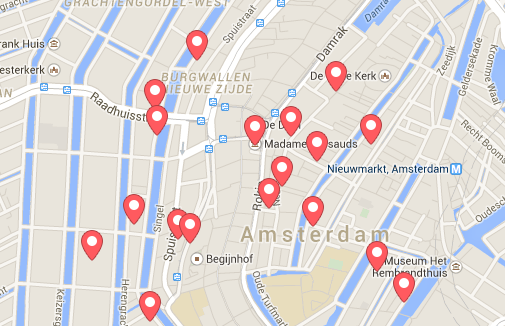Airbnb hosts in Amsterdam are in a gray area after a court ruling

Map showing Airbnb locations in central Amsterdam
People who rent their homes to tourists through platforms like Airbnb will be operating in a gray area until new national legislation comes into force this summer, legal experts say.
On Wednesday, the Council of State declared that it was illegal to rent property to tourists without a permit because the owners effectively remove a house from the national housing stock.
The decision, which was unexpected, gave a boost to people campaigning against holiday rental platforms, and Amsterdam Alderman Laurens Ivens said it was an important step in the fight of the city against the explosive growth of vacation rentals.
In formal terms, the ruling means anyone who rents a property to tourists without a license is breaking the law. However, no local authority has actually implemented a license system for renting to tourists.
Lawyers are divided on what people should do now. Victor Oranje of WS Advocaten, told the Volkskrant landlords must apply for a permit anyway, so that they are covered if councils start enforcing the new law. In contrast, Jim Friedrich of Quest Advocaten suggests people wait and see what happens next.
However, others warn that the situation would be further complicated if neighbors complained to the town that houses were rented illegally, as councils would then be forced to act.
Good
The Council of State decision was handed down in the case of a woman who was appealing a €6,000 fine from Amsterdam City Council for failing to register the fact that she was renting out her property to tourists Americans.
The fine was deemed illegal, as she had been convicted on the wrong grounds. Instead, the court heard, she should have been fined for breaching the Housing Act, which carries a fine of €20,500, triple the other charge.
Lawyers now say other people fined for failing to comply with Amsterdam’s statutes could challenge this in court, based on the decision of the Council of State.
New legislation
The gray area, however, is only expected to last until the summer, when the government aims to introduce new legislation on holiday rentals. These national rules will allow local authorities to require holiday rentals to be registered in areas where housing supply is scarce.
This registration number must then be included in advertisements on platforms such as Airbnb.
But the platforms have already made it clear that they will not require landlords to include the registration number, leading campaigners to say the legislation does not go far enough.
Acting Housing Minister Stientje van Veldhoven told websites like Airbnb late last year cannot be compelled to return information to advice for verification, as this would go against EU directives which consider holiday rental websites as information platforms.
“More ambitious measures will require long-term lobbying in Brussels,” she said, quoted by the NRC.
Airbnb said in a statement that it wants to work with governments to help hosts follow the rules. “Situations like this are puzzling, which is why we have backed calls for a European digital services regulator,” the company said. “This would provide a clearer, more consistent and predictable process for establishing rules and regulations in Europe.”
Thank you for your donation to DutchNews.nl
The DutchNews.nl team would like to thank all the generous readers who have donated over the past few weeks. Your financial support has helped us extend our coverage of the coronavirus crisis into evenings and weekends and ensure you are kept up to date with the latest developments.
DutchNews.nl has been free for 14 years, but without the financial support of our readers, we would not be able to provide you with fair and accurate information on all things Dutch. Your contributions make this possible.
If you haven’t donated yet, but would like to,
you can do it via Ideal, credit card or Paypal.

Comments are closed.